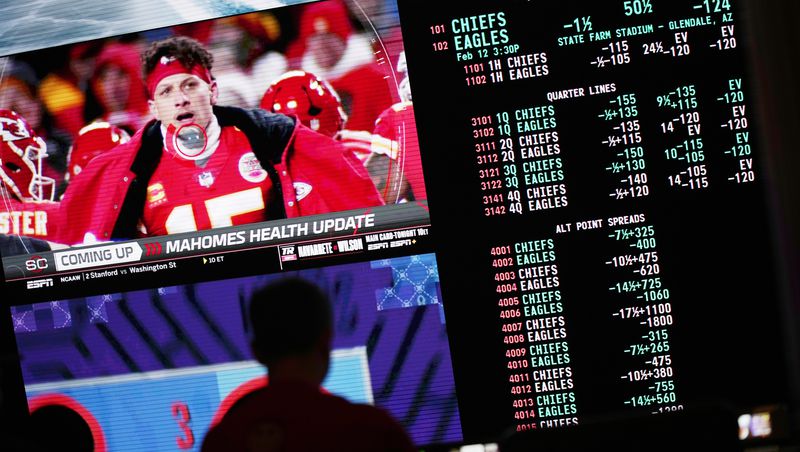
Utah lawmakers and members of Congress are laser focused on social media and how it affects teenagers and young adults, and rightfully so. Under pressure recently, Meta CEO Mark Zuckerberg even apologized during a congressional hearing to the families whose children have suffered and died and whose perpetrators were aided by social media and its algorithms.
It was a powerful moment, but it made me wonder. When do we get apologies to the victims of an ever-expanding gambling industry and its destructive tactics, aided by artificial intelligence?
And why on earth would a conservative state lawmaker be pushing to make a state-run lottery legal in Utah? A growing body of research shows Utahns should be glad their state is one of the few that hasn’t been lured by a lottery’s false promises.
The Super Bowl this Sunday will, for the first time, take place in Las Vegas. When I was a reporter there in the 1980s, that was unthinkable.
As The New York Times reminded readers a couple of years ago, in 2012 “a lawyer for the NFL argued that the league was adamantly opposed to sports gambling because it would ‘negatively impact our long-term relationship with our fans, negatively impact the perception of our sport across the country.’”
Now, you can’t turn on a game without being bombarded every few minutes by advertisements urging you to place bets on games, and even on plays within games. In my time in Las Vegas, the NFL treated the city as if it were possessed with a highly contagious disease. Now, it has a team in the city and welcomes all bettors, except active players or team employees, of course.
ESPN cited American Gaming Association estimates that Americans may wager $23.1 billion on Sunday’s game, with 26% of all adults making bets.
Related
Despite the denials from gambling companies, to pretend gambling’s antisocial dangers, so evident in the past, have suddenly disappeared, is as ridiculous as pretending that gambling itself hasn’t surged because of all the ads.
To couch this in terms of personal liberty is as tone deaf as to say the Founding Fathers sacrificed all so that we could play games of chance in our pajamas.
Last weekend, the CBS show “60 Minutes” did a report on all this that included the startling fact that “there is no federal funding for gambling research,” meaning that Washington isn’t interested in gathering data about how unleashing a barrage of sports betting on the public has affected public health.
“60 Minutes” interviewed Harry Levant, a reformed gambler and a therapist who specializes in gambling addictions. Sports gambling companies use algorithms fueled by artificial intelligence to produce odds and to draw people in, he said.
Levant said smartphones have fueled gambling addictions. “I have patients who gamble in the shower. I have patients who gamble before they get out of bed in the morning. I have patients who gamble while they are driving,” he said. “There are no guardrails.”
The proponents of sports gambling will claim Americans were always wagering on sports. Legalizing it just makes sure it’s aboveboard and regulated.
That doesn’t pass the smell test.
Sam Skolnik, author of the book “High Stakes: The Rising Cost of America’s Gambling Addiction,” calculates that Americans lost $92 billion on wagers in 2007, “which was about nine times what they lost in 1982,” when gambling and casinos were mainly confined to Nevada and Atlantic City, according to his website.
“Because of this unrelenting growth, millions of us for the first time have been exposed to gambling. As a result, there’s been an increase in the number of addicted gamblers around the country,” his site says.
A recently released survey by the Siena College Research Institute in collaboration with St. Bonaventure University’s Jandoli School of Communication found that 39% of Americans today place sports-related wagers, including 39% of young men. “60 Minutes” reported that New Jersey’s helpline for problem gambling has seen a tripling of calls since the state legalized sports gambling, with the largest share coming from those 25 to 34 years old.
Against this backdrop, it’s astounding that Utah state Rep. Kera Birkeland, a conservative Republican, is sponsoring a resolution aimed at legalizing a state lottery. She claims Utah is losing hundreds of millions of dollars a year from residents who travel out of state to play lotteries. She makes vague claims that proceeds from the lottery could help lower property taxes.
Not only does this equation ignore the costs, history shows legalizing a lottery would unleash state-sponsored advertising that would induce a host of societal ills that prey mostly on the poor. And the ads would be conveniently exempt from the federal trade commission’s truth-in-advertising laws. The Washington Post found that states that adopted lotteries to help public education still have schools that are starved for cash.
Will governments ever begin to confront the damage they have done through lotteries, casinos and sports wagering? Will they ever have to confront their victims the way Zuckerberg did?
Dick Daynard, a Northeastern University law professor who was among the first to take on tobacco companies years ago, hopes so. He has launched a lawsuit and is lobbying the federal government for regulations. He told “60 Minutes,” “We’re dealing with an addictive product.”
Some day, that may be as obvious to everyone as a cigarette in a restaurant.